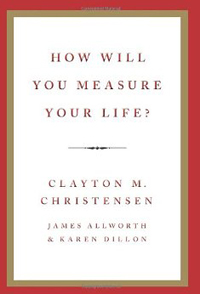Book Notes
 Clayton M. Christensen, James Allworth and Karen Dillon, How Will You Measure Your Life? (New York: HarperCollins, 2012), 221pp.
Clayton M. Christensen, James Allworth and Karen Dillon, How Will You Measure Your Life? (New York: HarperCollins, 2012), 221pp.
On the last day of class at Harvard Business School, professor Clay Christensen shares with his students some observations he's made from attending his own HBS class reunions. At the five-year reunion, all his classmates seemed "polished and prosperous." Life was good for an HBS high-flyer. The ten year reunion was different. Some people didn't attend. Some had divorced. Happiness seemed elusive for many friends. Then came the reunion at thirty years, when his former classmate Jeffrey Skilling of Enron infamy was in jail.
What had happened? Clearly, there was a big disconnect between personal happiness and professional success for these privileged people who enjoyed every advantage. In 2010, Christensen was chosen by students to address the entire graduating class at HBS. It was a pivotal moment for him since he had just been diagnosed with a life-threatening cancer that had killed his father. As he had done with his one class, he shared his insights about what, exactly, constitutes a successful life, and how you can achieve that.
This book summarizes his insights that have emerged from those class discussions. He asks three questions. First, how can you choose a career that you'll truly enjoy and not merely endure? Second, how can you attain happiness with your spouse, family and friends? The third question seems odd, but maybe not since Skilling was his classmate: how can you stay out of jail and live a life of integrity? For all three questions Christensen expounds theories and practical examples from the business world and transfers them to personal life. For example, don't "outsource" you kids. Invest for the future. Or again, we hear of "corporate culture," but we also have a "family culture."
There's no magic sauce here, just sanctified common sense. But common sense can be uncommon. There's a big difference between being smart and wise, between being professionally successful and personally fulfilled. At the end of the book Christensen shares how his Mormon faith and family have helped him address these questions. For a similar take on wise advice, see the book by the Cornell University gerontologist Karl Pillemer, 30 Lessons for Living; Tried and True Advice from the Wisest Americans (2011), based upon Pillemer's empirical study of elderly Americans.


